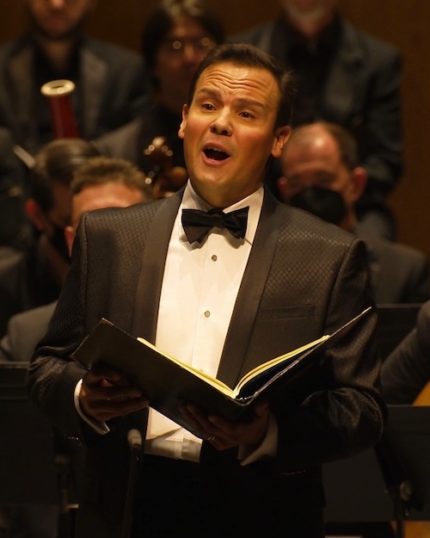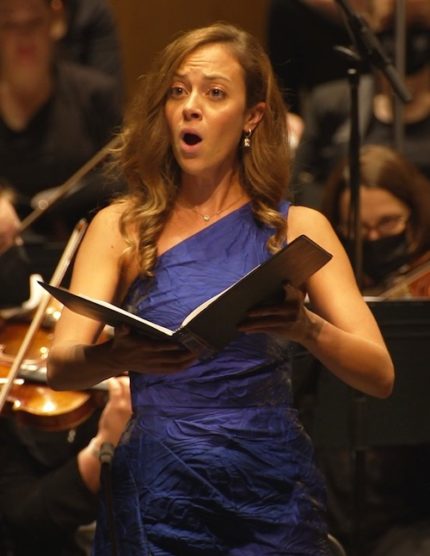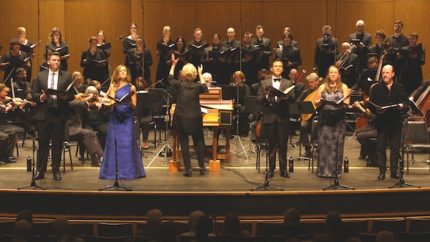Glover, first-class cast open MOB season in thrilling fashion with Handel’s “Jephtha”

Rare the music organization that manages to hit a grand slam in the very first concert of a fresh fall season.
But such was the case Sunday night in Skokie when Dame Jane Glover opened her 20th season leading Music of the Baroque with an intensely dramatic and thrillingly sung performance of Handel’s Jephtha. There is one repeat tonight at the Harris Theater and no self-respecting opera or Baroque aficionado should miss it.
Handel was normally a lightning-fast composer. But by 1751, his vision was failing along with his health, and Jephtha took seven months to complete. Yet in this work—Handel’s final oratorio and his last significant composition—there is no sign of flagging inspiration and Jephtha abounds in musical riches, for soloists and chorus alike.
The narrative tells of the title Israeli warrior who promises God that if he emerges victorious in a key battle against the Ammonites he will sacrifice the first being he sees upon his return. Unfortunately, that person is Jephtha’s beloved daughter, Iphis. Jephtha is horrified by this turn of events yet, despite the pleas of family members and Iphis’s fiancee, he is resolute in vowing to keep his word to God. At the 11th hour an angel appears and states that Jephtha’s vow can be met, not by human sacrifice, but by Iphis remaining a virgin dedicated to God for her lifetime, which she agrees to amid general rejoicing. Better unbed than dead.
As rickety and off-putting as the scenario may be for modern listeners, the music is consistently inspired—choruses are especially remarkable—and the very human reactions of all the characters, Iphis in particular, are painted by Handel with typical insight and sensitivity.
Glover has stated that she has been wanting to present Jephtha, a work she highly esteems, in Chicago for a long time. MOB’s music director was most skillful in her trimming of the score, managing to keep the evening at around 2-1/2 hours (including intermission) without losing anything essential.
Glover led a boldly dramatic, silver-screen performance of Handel’s oratorio at the North Shore Center, one that made even veteran Handel hands seem pallid and ascetic by comparison. The evening moved with crackling urgency and Glover brought out the ingenuity of the music as well as the deep vein of feeling at its core.
The performance benefited enormously from a lineup of soloists that was first class across the board, not just adequate or familiar.
David Portillo, a superb David in Lyric Opera’s 2013 Meistersinger, is a singer we don’t hear nearly enough in Chicago. Portillo may not have physically represented the bearded biblical patriarch, but he brought first-class vocalism and searing dramatic intensity to the title role.
Portillo sang with luxuriant tenor tone, daunting power and striking flexibility, with every word crystal clear. He conveyed the roiling pain of Jephtha’s conflicted soul in his late soliloquy (“Deeper and deeper still”) and delivered the oratorio’s most indelible aria, “Waft her, angels, through the skies,” with utmost delicacy and refined depth of feeling.
He also put across Jephtha’s emotions with apt theatricality, as with his violent outburst (“Fly, begone!”) at Iphis for greeting him and inadvertently becoming the victim of his promised sacrifice.

As the almost-sacrificial daughter, Lauren Snouffer’s affecting performance as Iphis was on a comparable level. The soprano brought a bright, youthful tone and easy agility (as in “The smiling dawn of happy days”) to her singing. Snouffer was charismatic in “Tune the soft melodious lute”—with Mary Stolper’s obbligato flute equally lilting— and most affecting in her latter tragic arias.
Within the confines of the concert format, Snouffer managed to subtly make the drama register, smiling warmly at her fiancee Hamor in the love duet (“These labours past, how happy we!”) and slowly lowering her head when Jephtha angrily banishes her.
As her beloved Hamor, countertenor Aryeh Nussbaum Cohen has clearly fulfilled the career promise of his 2017 Chicago debut with the Newberry Consort. Cohen sang with a refulgent, evenly produced tone, far removed from many a wispy high male voice. He also showed a stage actor’s ease in making this rather weakly drawn character seem dramatically credible.
As Storge, Clara Osnowski brought a warm, aptly maternal mezzo to the role of Jephtha’s wife, yet displayed striking fury at Iphis’s impending execution in “Let other creatures die.”
Neal Davies got the proceedings off to a lively start as Zebul. The British bass-baritone etched a characterful turn as Jephtha’s brother, wielding his big voice with surprising facility.
Katelyn Lee, a regular MOB chorus member, sang solidly in the brief, deus ex machina role of the Angel who delivers the climactic news about Iphis’s salvation.
The orchestra playing had a few fleeting fluffs Sunday but was consistently committed and energized. The clarion trumpet playing of Barbara Butler and Matt Baker soaring exhilaratingly over the ensemble.
In Andrew Megill’s first assignment since taking the reins officially, MOB’s new chorus director scored a triumph. As consistent as the ensemble has been in recent years, the MOB Chorus seemed to be singing at a whole new level of intensity and brilliance far beyond their numbers. The choral challenges are considerable in Jephtha, and the ensemble tackled them all with daunting verve and polish, making Handel’s forward-looking harmonies register with bracing impact.
The sole, not-insignificant glitch Sunday night was that the projected supertitles didn’t work at all for the long first half of the evening. This lapse did not prove fatal in an English-language work and with soloists singing with such distinct enunciation. Still, in a prestige show like this, the technical epic fail was felt in such a text-driven work.
